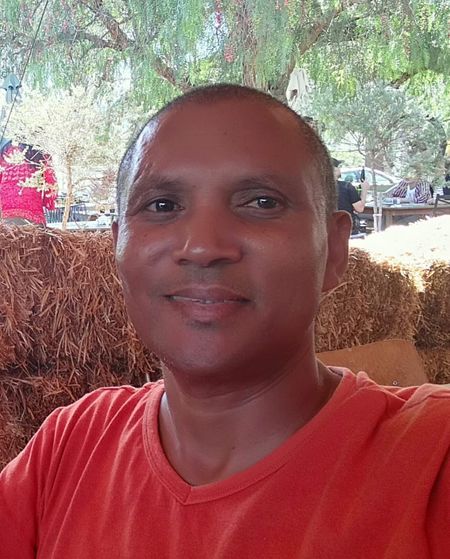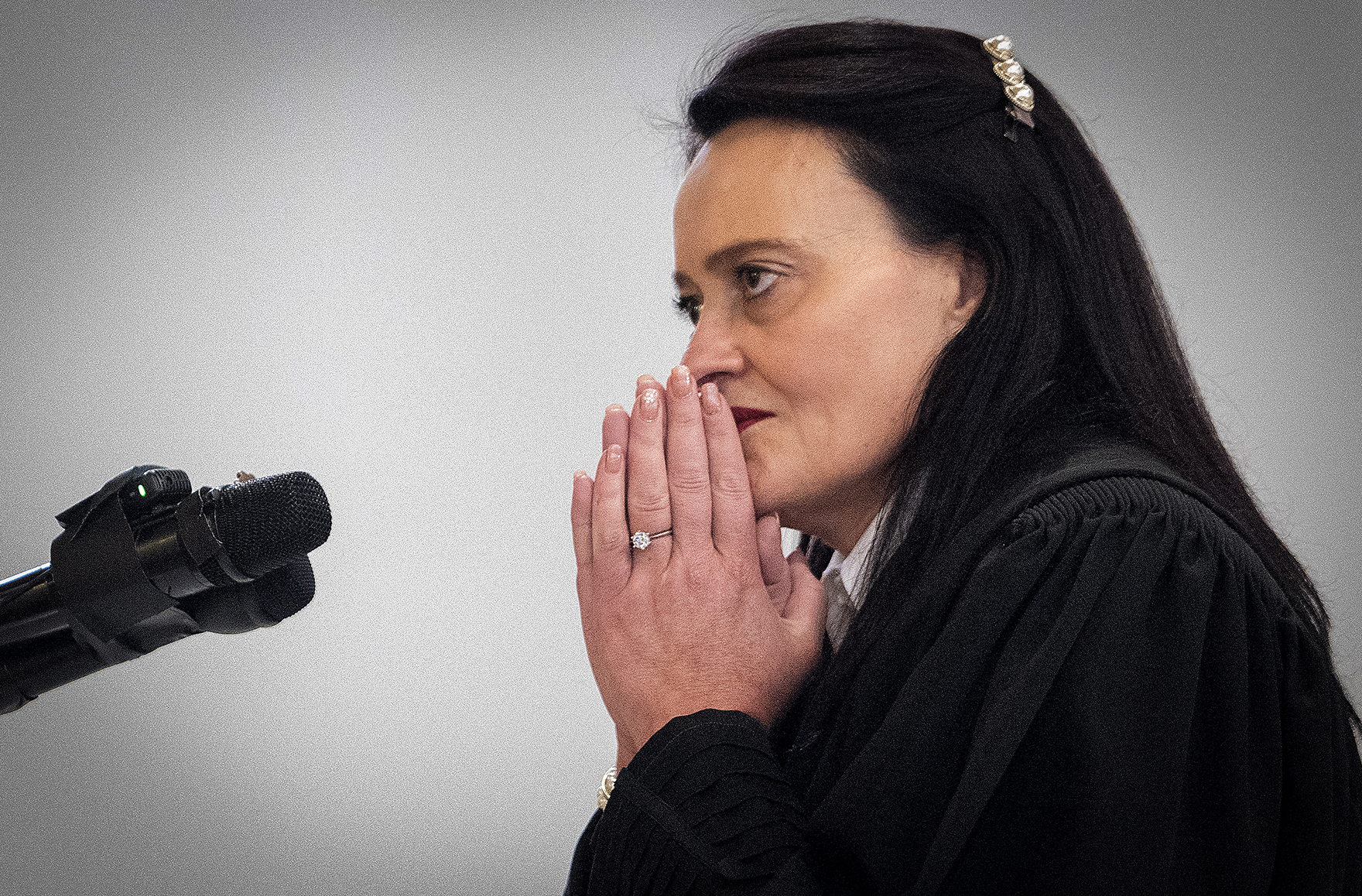State prosecutor Zelda Swanepoel was asked during a webinar the day after Joshlin Smith's traffickers and kidnappers filed for leave to appeal against their conviction and life sentences whether she still believed the little girl was alive. She responded that “we have done a comprehensive search in Saldanha of all the exhibits. Everything that was found in all of those dunes, all the bones, all the clothing, was analysed, there were no positive DNA results found on anything.
“I’m convinced that she is still alive. However, I don’t know where she is. I can only hope we find her.”
Dr Beatri Kruger, a research fellow at the Free State Centre for Human Rights, asked what would happen if the State now found the sangoma who was said to have been involved and if there had been a muti murder.
/file/dailymaverick/wp-content/uploads/2025/06/ED_560160.jpg)
“Yes, the case has been finalised,” Swanepoel replied. “If we now receive any other evidence or information… as to who Joshlin was sold to or delivered to, and we find that person, we find the exploiters, we will still be able to prosecute all of those people.
“That will be a separate prosecution. It would be a new case docket, new evidence and evaluation thereof – our test is if there is a reasonable prospect of successful prosecution before we go to court.”
Swanepoel, the Deputy Director of Public Prosecutions in the Western Cape, is part of the Organised Crime component of the DPP office in Cape Town, and has dedicated the past 18 years of her career to combating human trafficking.
The online webinar was hosted by the National Freedom Network. Rene Hanekom from the network underlined that Swanepoel’s extensive work included guiding investigations, prosecuting numerous trafficking in persons (TIP) cases and providing multisectoral training across various stakeholder groups.
/file/dailymaverick/wp-content/uploads/2025/06/ED_559108.jpg)
The online webinar was held a day after convicted and sentenced traffickers and kidnappers, Jacquen Appollis, also known as Boeta, Steveno van Rhyn and Joshlin’s mother, Racquel Smith, also known as Kelly, filed their leave to appeal application against their convictions and life sentences in the kidnapping and trafficking in persons case stemming from Joshlin’s disappearance on 19 February 2024.
On Thursday, 29 May 2025, Judge Nathan Erasmus imposed life sentences for trafficking in persons and 10 years for kidnapping on all three in the Western Cape Division of the High Court, sitting in Saldanha Bay.
/file/dailymaverick/wp-content/uploads/2025/05/ED_558902.jpg)
Read more: Final verdict delivered: Life sentences for trio in Joshlin Smith kidnapping case
Boitumelo Boshupeng, of Legal Aid SA, which represented the convicted trio, said that “we can only confirm that our clients have shown interest in lodging appeals in this matter and we are not in a position to comment any further.”
Prosecution challenges
Swanepoel told the webinar that when she heard of the disappearance of Joshlin, “I knew that it was going to be difficult because there is no precedent, there is no similar case available. I knew it would be necessary to develop the law; this was therefore a test case and identified as such.”
While the investigation was still active, the prosecution hoped that Joshlin would be found.
“The minute we would find her, we would be able to know what happened to her because she would be able to tell us. We were following all the leads, but it is so that at some stage, you have to draw a line and you have to say this is far enough.
“We realised we sat with the evidence that we had, but it was just not enough. So we needed an insider, and that is where (State witness, Lourentia “Rens” Lombaard) came in and where her status changed,” she explained.
However, as it turned out, Lombaard’s evidence was riddled with inconsistencies and Judge Erasmus at some point during the trial said that “she was not the best witness”.
“We knew we were going to rely on Lombaard. She was going to be the most important witness, and her testimony was going to be corroborated in part by Steven Coetzee, but both of them are single witnesses on the crux of their evidence.
“Hence, the State needed corroboration for both of their testimonies. So we decided to tell the story from the time it happened, setting the scene from the time that Joshlin went missing,” she explained.
Another challenge the State faced, she added, was the sad reality that many of the witnesses in the matter suffered from drug addiction, “so we knew from the start we need[ed] to consult with each and every witness in order to determine whether they would be credible witnesses or not”.
The media scrutiny was also challenging, and it felt as if the team was constantly under a microscope.
“Similarly… for the witnesses, now the world sees and hears exactly what they said and their facial expressions. There was no way in which we could protect them. There was nowhere for them to hide. Testifying in court is a traumatic event. Now it was amplified by the fact that the media were there all the time.
“We were always hopeful during the trial that the accused would come and testify in the main trial. The plan was to destroy their credibility and demonstrate the improbabilities in their versions. Yes, their decision to remain silent, especially Kelly, was very disappointing,” Swanepoel said.
Contributions played pivotal role
Swanepoel said the outcome in the case was a landmark decision – the first prosecution and conviction for trafficking in persons where a child was sold, and who has not yet been found.
“Because we didn’t have a victim, we didn’t have Joshlin and her version, there was no evidence of this specific type of exploitation. Usually, a TIP matter starts with the recovery, finding the victim, and the victim tells his or her story. The victim is the most important witness in a TIP case.”
Advocate Nicollete Bell, the Western Cape Director of Public Prosecutions, welcomed the sentences and emphasised that the case was testament to the National Prosecuting Authority’s (NPA) commitment to protect the rights of children.
Swanepoel commended the media for its coverage of the case and also lauded Dr Marcel van der Watt, an expert in trafficking in persons, for his valuable virtual testimony.
“Doctor Beatri Kruger, a research fellow at the Free State Centre for Human Rights, is the only one in South Africa who has a comprehensive list of all the cases, and is always the first to know whenever anything happens in the field of trafficking. She is truly my first port of call to find any case and any authority for any specific argument,” Swanepoel said.
She also highlighted the victim’s impact report that was read into the record by probation officer Deonett Boltney, which sank the bid by the accused for a lesser sentence.
“This was a team effort. No one could have done this alone, especially the investigating and prosecuting team; several civil society organisations and individual community members that were involved in the search for Joshlin – I truly have no words to describe their dedication and commitment to this cause,” Swanepoel said.
Swanepoel also extended a special thank you to the group of women who prayed in front of the court every day, and said they would cherish the flowers they were given by community members.
“The bouquet of flowers we received was the very first time that I received a bouquet of flowers on the day of judgment. It was a first for me and my colleague. It was truly a humbling experience,” she said.
Background
Smith, her boyfriend Appollis, and Van Rhyn were found guilty of the charges stemming from Joshlin’s disappearance on 19 February 2024 from the Middelpos informal settlement in Saldanha Bay.
Later on that evening of 19 February 2024, Kelly started looking for Joshlin and later that night reported it to the SAPS. A missing persons case was opened. The three were arrested in the early hours of 5 March 2024.
Sangoma Phumza Sigaqa, also known as Makalima, was arrested at the same time, following accusations levelled by Appollis and Van Rhyn against her. The case against her was later withdrawn.
Lombaard was arrested on 15 March 202, and a confession was obtained from her on the same date. On 21 October 2024, the case against her was withdrawn and she became a State witness.
The three accused, who pleaded not guilty, denied the allegations against them throughout the trial. The State alleged that the accused “sold, delivered or exchanged” Joshlin, a Grade 1 pupil at Diazville Primary, for money.
Appollis and Van Rhyn implicated themselves when they said Joshlin was taken to a supposed sangoma on the day she went missing. Judge Erasmus ruled that the accuseds’ confessions in the trial were admissible and could be used as evidence against them.
The trio chose to remain silent and neither took the stand nor called any witnesses in their defence. DM





 State Prosecutor advocate Zelda Swanepoel during sentencing proceedings on 28 May 2025 in the Joshlin Smith kidnapping trial. (Photo: Gallo Images / Die Burger / Jaco Marais)
State Prosecutor advocate Zelda Swanepoel during sentencing proceedings on 28 May 2025 in the Joshlin Smith kidnapping trial. (Photo: Gallo Images / Die Burger / Jaco Marais)